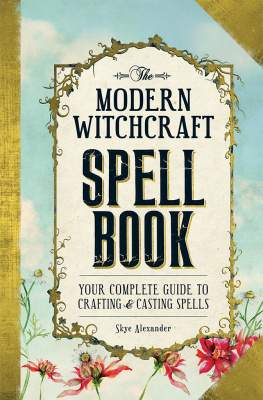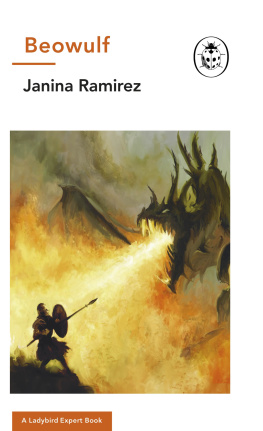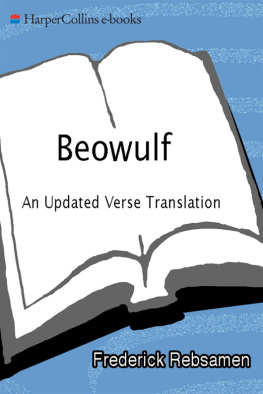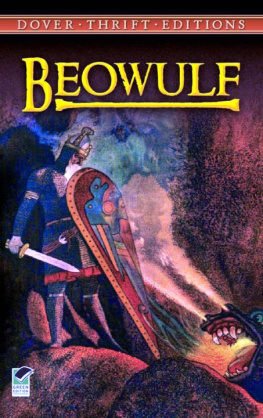
BEOWULF:
A Verse Translation
Beowulf is much the most substantial of the Old English poems we have. It survives in a single manuscript of about the year 1010, but was composed generations earlier. Its story is set centuries earlier still, on the North Sea coasts from which the Angles and Saxons came to Britain. It shows the northern heroic world, a world of deep interest to its Christian audience as the world of their ancestors, presenting it with a tragic reserve. Its poetic dignity is well kept in this classic of verse translation, often broadcast and anthologized since its first publication in 1973.
MICHAEL ALEXANDER, Berry Professor of English Literature at the University of St Andrews, has published widely on modern as well as medieval poetry. Having edited Beowulf: A Glossed Text for the Penguin English Poets in 1995 (revised in 2000), he has now carefully revised Beowulf A Verse Translation, providing a new Introduction and much fuller notes. A poet as well as translator, his first book, The Earliest English Poems, appeared in Penguin Classics in 1966, his most recent, A History of English Literature (Palgrave Macmillan), in 2000.
BEOWULF
A Verse Translation
Revised edition
Translated with an Introduction and Notes by
MICHAEL ALEXANDER
PENGUIN BOOKS
PENGUIN BOOKS
Published by the Penguin Group
Penguin Books Ltd, 80 Strand, London WC2R ORL, England
Penguin Putnam Inc., 375 Hudson Street, New York, New York 10014, USA
Penguin Books Australia Ltd, 250 Camberwell Road, Camberwell, Victoria 3124, Australia
Penguin Books Canada Ltd, 10 Alcorn Avenue, Toronto, Ontario, Canada M4V 3B2
Penguin Books India (P) Ltd, 11, Community Centre, Panchsheel Park, New Delhi 110 017, India
Penguin Books (NZ) Ltd, Cnr Rosedale and Airborne Roads, Albany, Auckland, New Zealand
Penguin Books (South Africa) (Pty) Ltd, 24 Sturdee Avenue, Rosebank 2196, South Africa
Penguin Books Ltd, Registered Offices: 80 Strand, London WC2R ORL, England
www.penguin.com
This translation first published 1973
Revised edition published 2001
Reprinted with corrections 2003
I
Copyright Michael Alexander, 1973, 2001
All rights reserved
The moral right of the translator has been asserted
Except in the United States of America, this book is sold subject to the condition that it shall not, by way of trade or otherwise, be lent, re-sold, hired out, or otherwise circulated without the publishers prior consent in any form of binding or cover other than that in which it is published and without a similar condition including this condition being imposed on the subsequent purchaser
9780141902937
In memory of Joseph and Winifred Alexander
Contents
Acknowledgements
In preparing this second edition, I thank my editors at Penguin Classics for their help, and acknowledge again those who helped with the first: Betty Radice, who commissioned it; Arthur Cooper; Eileen McCall; friends at the University of Stirling; staff at the British Museum.
Preface
This translation of Beowulf was first published in 1973 by Penguin Books, who had published The Earliest English Poems in 1966. These poetic translations from the Anglo-Saxon have been liked by poets and anthologists, by radio producers, playwrights and composers, and by many readers. Together the two volumes have sold over half a million copies. Old English poetry has become popular.
Tennyson was the first to translate a few lines of Beowulf in 1830. Other writers attracted to the poem have included William Morris, J. R. R. Tolkien, W. H. Auden, Jorge Luis Borges, Richard Wilbur, Edwin Morgan, Seamus Heaney. Beowulf has often been edited, and has been translated hundreds of times and into many languages. Its fame is still growing: three new scholarly editions of the Old English text have been published since 1994, including the Penguin English Poets Beowulf: A Glossed Text in 1995, revised in 2000. The second edition of Beowulf: A Verse Translation brings the translation into line with that version of the Old English text.
Recent editors have made a number of small changes to the text of the original. Newly accepted readings are acknowledged in the Notes, and the phrasing of the translation has been adjusted in about forty places. There is a new and fuller Introduction. The list of Further Reading has been extended to take account of recent scholarship, and the Notes have been much amplified. The text has been reset with line numbers every ten lines. Taken together, these changes are substantial, and the result is virtually a new book. While a redrawn Map remains with the Index of Proper Names at the end, the Introduction is now followed by the three Genealogical Tables a rearrangement which reflects changes in understanding. Beowulf now seems a poem less about physical history and more about human nature and its ancestry.
Introduction
Beowulf, the first substantial work in English, has a severe artistic dignity and a penetrating understanding of human life. Deeply rewarding as literature, it also has great cultural as well as historical interest. The crucial episodes of Beowulfs life-story unfold against a historical background of epic scope. As a young man, he defends the Danes against terrible enemies. When he comes to rule his own people, he gives them a long period of peace. In old age he successfully defends them against an enemy who had destroyed their houses by fire. He dies in this action, and the narrative ends with a prophecy of the enslavement of Beowulfs people and the building on a headland of a monumental tomb for him. His adventurous life is set on the shores of southern Scandinavia and the coasts of the North Sea. The name Beowulf is not historical, and his deeds belong to legend, but they take place in a believable historical world, the world of those who ruled the coasts surrounding Denmark in the fifth and sixth centuries.
This age, towards the end of the period known as the Wandering of the Peoples, is presented as a heroic age. Beowulf is the nephew of Hygelac, king of the Geats, a people of southern Sweden. Hygelac is certainly historical: the sixth-century Gregory of Tours, and two other Latin historians, tell us that he fell in a warlike raid on some peoples living near the mouth of the Rhine in about the year 521. By 521 Angles, Saxons and Jutes had occupied parts of south-eastern Britain, but Beowulf does not mention Britain. The poem is set in a north Germanic world before the arrival of Christianity, but it was written it is agreed by scholars in England, in English, for an English Christian audience. What was its interest for that audience?
The poems text survives in a single manuscript copy in the British Library, dated to about the year 1010. We do not know the circumstances of Beowulfs composition, and its date is not agreed, but there is some reason to think that it may have reached what is substantially its present form before the year 850. It is a literary poem, but many of its techniques and much of its material originate in older oral traditions. The poem is anonymous, and likely to remain so. It is the first large poem in English it has more than three thousand lines yet, as we have said, these lines include no reference to Britain. What was its interest for its English hearers, some of whom had been settled in Britain for as many as ten generations? Later audiences have found it a good story, but for its first audiences it was a good story about their ancestors.
Next page












